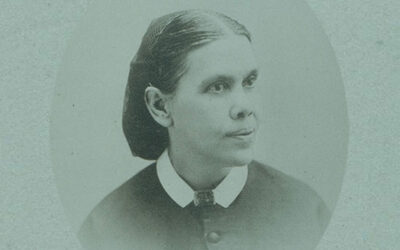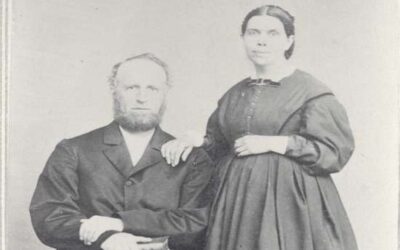Worry and fear are the ingredients of anxiety. It’s easy to see how the world isn’t perfect—and the anticipation of a bad event or experience (that may or may not even happen) can end up draining the peace and enjoyment from anyone’s life.
As it turns out, there are several examples in the Bible about people who were deeply worried or afraid. And the good news is that each of those examples have a corresponding passage that teaches us what we can do when we feel uneasy, anxious, or downright scared.
So let’s dive into the Word of God and discover:
- The causes of worry and fear
- What the Bible says about worrying
- How you can apply the Bible’s advice and overcome worry
We’ll begin by looking at the reasons behind our fears.
What causes us to worry or to be afraid?
It all starts with stress. When we’re overwhelmed, everything feels worse.
Add some fear of the unknown into the mix, and it’s a perfect storm of worry, dread, and cycles of anxious thoughts.
Essentially, we feel helpless. The lack of control hits us hard. Especially when accompanied by pressure, internally or externally, that you still must manage everything perfectly.
Stress is defined as any demand placed on your brain or body. So it’s inevitable that we’ll experience stress all throughout our everyday lives.
However, we feel “stressed out” when too many competing demands are placed on us all at once, making us feel frustrated, nervous, helpless, overwhelmed, depressed, anxious…the list can go on. And if the stress is severe, it can lead to aggressive behavior.
While a higher amount of stress isn’t always bad in the short term—like compelling us to study for an exam or overcome a big challenge—it’s still meant to be temporary.
If the worry and dread becomes so constant that it interferes with your daily life and interactions with others, then of course it becomes a serious problem.
In some cases, it could result in a diagnosis of a mental health issue under the broad category of anxiety disorders.
Other causes of worry include:
- Traumatic events – People who experience or witness abuse or trauma as children or as adults tend to develop anxiety disorders at some point in life.
- Major life changes – Events like moving to a new home, starting a new school or job, getting married, or even having a baby can cause worry if things aren’t going well or don’t meet prior expectations.
- Illness – Suffering from health condition or serious illness can cause significant worry about treatment options, expenses, preparing for the future, etc.
- Overwhelm – A big event, or a gradual buildup of smaller difficult life situations, can trigger anxiety. It could be a death in the family, work stress, family tension, or ongoing financial difficulties.
- Personality type – People with certain personality types tend to worry more than others—especially those who tend to think deeply about every detail of their lives.
- Mental health conditions – Any struggle with mental health can also cause anxiety. When it feels like the rest of the world operates differently than you do, the uneasiness or frustration can build up into anxiety.
- Genetics – Anxiety disorders can run in families. So having blood relatives with an anxiety disorder can predispose you to frequent worrying.
- Drugs or alcohol – Use, misuse, or withdrawal of drugs and alcohol can cause or worsen anxiety.
- Some prescription medications – Some medicines, like asthma inhalers, diet pills, and thyroid medications can worsen anxiety, especially if the ideal dosage is still being figured out.
Worrying over a long period of time can lead to other health problems:
- Medical conditions such as heart disease or high blood pressure
- Depression
- Lack of sleep
- Social isolation
- Inability to be productive at work or at school
- Suicidal thoughts
In these cases, the best advice is professional advice. This can be in the form of counseling, medication, or in some cases, lifestyle coaching.
If you or someone you know is distressed and possibly considering suicide, seek help right away. Several agencies provide free and confidential emotional support, 24 hours a day, such as the National Suicide Prevention Lifeline in the US: 1-800-273-8255.
It’s important to know that you don’t have to face these things on your own. There are always people willing to help, and God is always with you, listening to your prayers.
What does the Bible say about worry and fear?

Photo by Aaron Burden on Unsplash
There are verses all over the Bible that describe people feeling worry or fear. Characters like David, Martha, and Job are just a few examples of worry in the Bible:
- “Fear and trembling come upon me, and horror overwhelms me” (Psalm 55:5, ESV).
- “Martha, Martha, you are anxious and troubled about many things” (Luke 11:41, ESV).
- “For the things that I fear comes upon me, and what I dread befalls me. I am not at ease, nor am I quiet; I have no rest, but trouble comes” (Job 3:25-26, ESV).
But the great news is that, for all the worrying that humans express in the Bible, there are even more expressions of comfort, the peace of Christ, and God’s love.
The Bible leads us away from worry, telling us we have no need to fear (we’ll talk about how to not worry in a moment).
For example, the poet and king David writes in Psalm 23:
“Even though I walk through the valley of the shadow of death, I will fear no evil, for You are with me” (Psalm 23:4, ESV).
The prophet Isaiah expresses a similar sentiment:
“Fear not, for I am with you; be not dismayed, for I am your God; I will strengthen you, I will help you, I will uphold you with My righteous right hand” (Isaiah 41:10, ESV).
And as a last example, the apostle Paul, in his letter to the Romans, encourages believers against all trouble, including fear and worry. He assures them that “neither death nor life, nor angels nor rulers, nor things present nor things to come, nor powers, nor height nor depth, nor anything else in all creation, will be able to separate us from the love of God in Christ Jesus our Lord (Romans 8:38-39, ESV).
But one part of the Bible that talks extensively about worry comes from Jesus, so let’s see what our Savior Himself has to say about dealing with the difficulties and uncertainties of life.
What does Jesus say about worry and fear?
In Matthew 6, Jesus is preaching what is known as the Sermon on the Mount. A large part of this message is about not worrying and not being anxious, and instead placing your trust on God to provide for your needs.
Jesus says:
“Do not worry about your life, what you will eat or what you will drink, nor about your body, what you will put on. Is not life more than food and the body more than clothing?
Consider the birds of the sky: They don’t sow or reap or gather into barns, yet your heavenly Father feeds them. Aren’t you worth more than they?” (Matthew 6:25-26, CSB).
And
“Which of you by being anxious can add a single hour to his span of life?” (Matthew 6:27, ESV).
And
So don’t worry, saying ‘What will we eat?’ or ‘What will we drink?’ or ‘What will we wear?’ For the Gentiles eagerly seek all these things, and your heavenly Father knows that you need them. But seek first the kingdom of God and His righteousness, and all these things will be provided for you” (Matthew 6:31-33, CSB).
And
“Therefore, do not worry about tomorrow, for tomorrow will worry about itself. Each day has enough trouble of its own” (Matthew 6:34, CSB).
This whole section, Matthew 6: 25-34, is the dedicated go-to for those struggling with fearfulness amid the challenges of life. Entire Bible studies focus just on this chapter—there’s so much to think about and meditate upon.
But now that we know God doesn’t want us to worry or be afraid, let’s look more closely at passages that help us actually overcome the worries in our lives.
How to overcome worry, according to the Bible

Photo by Sincerely Media on Unsplash
Similar to the advice Jesus gives in Matthew 6, the Bible’s guidance for dealing with anxiety and frustration has to do with turning to God and claiming His promises.
Here are 4 ways you can do just that:
1. Trusting God
Solomon, the man gifted with much wisdom, guides us to trust God instead of in ourselves:
“Trust the Lord with all your heart, and do not lean on your own understanding” (Proverbs 3:5, ESV).
When we let go of all the things we hold onto and lean on God, the Bible says “He shall direct your paths” (Proverbs 3:6, NKJV).
And we can know that He will guide our paths even if we take a wrong turn, “For He Himself has said, ‘I will never leave you nor forsake you’” (Hebrews 13:5, NKJV).
“…Do not be afraid or discouraged, for the Lord your God is with you wherever you go” (Joshua 1:9, CSB).
Paul expresses the freedom that comes from trusting in the Lord. He says, “the Lord is my helper; I will not fear; what can man do to me?” (Hebrews 13:6, NKJV).
Truly, if our trust is in God, we need not fear what the world throws at us, for Jesus has “overcome the world” (John 16:33, ESV).
2. Reading God’s Word
God filled His Word with consolations for us in times of distress. The author of the Psalms especially leaned on God’s instruction when he was suffering.
David writes, “When the cares of my heart are many, your consolations cheer my soul” (Psalm 94:19, ESV).
He also says, “Your word is a lamp to my feet and a light to my path” (Psalm 119:105, ESV).
We can also turn to God’s instruction and promises to remember God’s goodness.
To help make this part of your routine, you can start an online Bible study or even just go through the Bible one chapter at a time.
And here are just a few great Bible stories that involve people learning to trust God:
- Shadrach, Meshach, and Abednego trust God through the fire (Daniel 3)
- Daniel trusts God to save him from a death sentence (Daniel 6)
- Deborah trusts God to guide amid a difficult time for Israel (Judges 4-5)
- David trusts God and slays a giant (1 Samuel 17)
- A sick woman trusts God, makes her way to Jesus, and is healed (Mark 5)
3. Praying
Not only does prayer give us a direct line of communication with God, but it also helps to calm our spirits by turning all of our thoughts toward God.
The Bible directs us to pray to God not matter what is troubling our minds:
“Do not be anxious about anything, but in everything by prayer and supplication with thanksgiving let your requests be made known to God. And the peace of God, which surpasses all understanding, will guard your hearts and your minds in Christ Jesus” (Philippians 4:6-7, ESV).
When we pray to God, the Bible says we will receive peace, which is exactly what we need in times of fear and worry. There is no peace like the peace God can give.
4. Giving your burdens to God and seeking His kingdom
Whenever we do pray to God, we can specifically ask for Him to take our burdens from us.
So many different things in life can feel like weight on our shoulders. But we don’t have to carry these burdens alone!
1 Peter 5:7 encourages us to be “casting all our cares on Him because He cares for us” (ESV).
And as we unload the weight of our worries onto Him, remember what Jesus said in Matthew 6 that we looked at earlier:
“Seek first the kingdom of God and His righteousness, and all these things shall be added to you” (Matthew 6:33-34, NKJV).
When we put God first, the Holy Spirit can fill our lives with peace. He’ll take care of everything else. Living the way that Jesus would live means giving our burdens to God and taking on the yoke of Jesus, which is full of peace:
“Come to Me, all who labor and are heavy laden, and I will give you rest. Take My yoke upon you, and learn from Me, for I am gentle and lowly in heart, and you will find rest for your souls. For My yoke is easy, and My burden is light” (Matthew 11:28-30, ESV).
A “yoke” is an ancient tool placed on cattle to help plow fields. These were heavy, and the animals wore them most of the day. But Jesus tells us that His “yoke” is easy and light.
When we cast our cares on Jesus and seek His righteousness, we will find rest. And not just rest for our bodies, but rest for our souls.
Jesus is the key to finding lasting peace
As you look to the Bible for wisdom and cast your burdens on God through prayer, you can begin looking into the future with hope. Hope of restoration, and that you have a chance at enjoying your life and finding the little blessings you might not have been able to see before.
But apart from this firm reliance on God, we have a part to play too.
There are simple things we can add to our daily routines that keep us on track when it comes to overcoming worry. And there are mindsets, or attitudes, we can cultivate that serve as a safeguard against worry and fear.
And with God helping you, constant worry can be a thing of the past.
Here are some Bible promises that assure us that God cares for you and there is no need to worry or fear.
Choose an Online Bible Study
Want to keep learning? Find out more about Jesus, humanity, the plan of salvation, and how God loves you enough to sacrifice everything, just to give you a chance to choose Him.
Sometimes it can be hard to know where to start, that’s why we offer free, user-friendly, online Bible study options you can do anytime, anywhere, and at your own pace.
This online Bible school will take you through the major themes of Scripture, breaking down the Bible’s complex concepts into bite-sized pieces, which can lead you toward the answers of life’s more challenging questions.
More Answers
What Does the Bible Mean When It Calls Jesus the Son of God?
When the Bible calls Jesus the Son of God it’s referring to His divinity. Learn what makes this so significant and what it has to do with salvation.
How Adventists View the End of the World
The end of the world is no fun to think about. But here’s how we can actually find hope and comfort in what’s to come.
What Is an Adventist Medical Missionary?
A medical missionary in the Adventist Church is someone who cares for the medical needs of people as a way of showing the love of Jesus. They may travel to another country, or even just serve in their hometown.
Is the Seventh-day Adventist Church Protestant?
Learn how the beliefs of the Seventh-day Adventist Church align with the “5 solas” of Protestantism.
The True Events Surrounding the Birth of Jesus
Jesus’ birth involved many strange events: a pregnant virgin, a stable birth, angels appearing to shepherds, and wealthy visitors. These help us understand His supernatural yet incredibly humble life.
Are Seventh-day Adventists Evangelicals?
According to its origins and definition, evangelicalism is about following Jesus and the Bible and sharing the Gospel through the way we live our lives. Adventists wholeheartedly harmonize with these principles.
Could Anything Keep Me from Becoming an Adventist?
We are each saved through Christ. But when it comes to church membership, are there certain beliefs or expectations to become an Adventist?
Do Seventh-day Adventists Have “Rules”?
We uphold principles we believe will help us maintain a closer relationship with Jesus and His Word. Learn how these principles guide Adventist lifestyles.
Your Comprehensive List of Ellen G. White’s Visions
Ellen White—an author, health-reform advocate, Bible scholar, and one of the most influential founding figures of the Seventh-day Adventist Church—was blessed by the Holy Spirit with the spiritual gift of prophecy (1 Corinthians 14; Romans 12:6-8). During her lifetime, she received direct guidance and inspiration from God in several different ways.
Do Seventh-day Adventists Have “Rules” For Marriage?
Around the world, many cultures and religions have various marriage traditions, expectations, or even rules when it comes to choosing a partner, planning the wedding, extended family logistics, or a number of other things.
An In-Depth List of the Prophecies About Jesus
How many prophecies of Jesus are in the Old Testament?
Can a Seventh-day Adventist Marry a Non-Adventist?
Yes. Seventh-day Adventists are not under any official rules that dictate who they can or cannot marry. This is a personal, life-altering decision between the couple and God.
What Adventists Believe About Alcohol and Tobacco Use
The Seventh-day Adventist Church has historically discouraged the use of alcohol and tobacco. Even before the church started in 1863, its leaders were realizing the negative effects of these substances.
What Does the Bible Say About Aliens and UFOs?
In 1938, aliens and UFOs were the subject of a mass prank. Around Halloween, Orson Welles performed a radio adaptation of H.G. Wells’ War of the Worlds. This ended up causing a panic throughout the United States—many people took it to mean that aliens had really attacked New Jersey.
What Do Adventists Believe About the Authority of the Bible?
Learn how one really old book (the Bible) is the sole foundation for all Seventh-day Adventist beliefs.
Is the Soul Immortal? Exploring What Adventists Believe
Based on the way the Bible describes humanity in comparison to God and angels, Seventh-day Adventists believe souls are not something you have, but something you are.
Jewelry—Why Do Many Seventh-day Adventists Choose Not to Wear It?
If you walk into a Seventh-day Adventist church service, you might notice that many people aren’t wearing earrings, bracelets, necklaces, or sometimes even wedding rings.
How the Bible Defines Love
Everyone talks about it, but do we really know what it means?
Why Does God Allow Suffering?
Poverty, genocide, a school shooting. A tsunami or earthquake that wipes out thousands of lives and leaves behind mourning family members.
International Pathfinder Camporee
Youth aged 10-15 in the Adventist Church’s global Pathfinder program look forward to the International Camporee every 5 years. This event brings together Pathfinders from around the world for exciting activities.
What Is Peter’s Ladder of Virtues, and How Does It Work?
Peter’s ladder of virtues is a phrase that refers to eight characteristics to be developed as a person grows in their relationship with Jesus Christ. It can be found in 2 Peter 1.
How Adventists interpret Bible prophecy
Bible prophecy conjures up a variety of emotions in people. For some, it feels exciting or mysterious.
What Counts as “Work” on the Sabbath?
God designed the Sabbath day to be a 24-hour period when we could pause and enjoy the goodness of His creation. We do this by putting aside our regular work so we can focus on spending time with Him and appreciating what He’s created (Exodus 20:8-11).
Moviegoers’ Guide to The Hopeful: The Facts Behind the Film
Learn where and when you can watch The Hopeful and how to get tickets. Already seen it? We’ll uncover the real story that inspired this film.
Protestant Reformation
Martin Luther. The 95 Theses. The Reformation. The Protest. Maybe you’ve heard these terms and wondered, What’s the big deal?
Ellen G. White’s Lasting Legacy
Ellen G. White is a well-known name among Seventh-day Adventists, but she also made an impact in many other parts of history, aside from being a co-founder of the Adventist Church.
Ellen G. White’s Challenging Health Journey
When it comes to lifelong struggles with health, Ellen White is no stranger. In fact, health challenges set the tone for her life early on—years before she was involved in co-founding the Seventh-day Adventist Church.
“What Was Ellen and James White’s Marriage Like?”
Ellen and James White, cofounders of the Seventh-day Adventist Church, met and married under somewhat unusual circumstances. But it’s a sweet story of partners in ministry becoming partners in life. And their married life continued to center on furthering the spread of the gospel together.
What Do Adventists Believe About the Mark of the Beast and 666?
It’s a popular topic, especially during tumultuous times. When everything around you feels chaotic, it’s easy to wonder about the end of the world, and topics like the mark of the beast, as mentioned in Revelation 13, can stir up uneasiness.
Didn’t find your answer? Ask us!
We understand your concern of having questions but not knowing who to ask—we’ve felt it ourselves. When you’re ready to learn more about Adventists, send us a question! We know a thing or two about Adventists.































